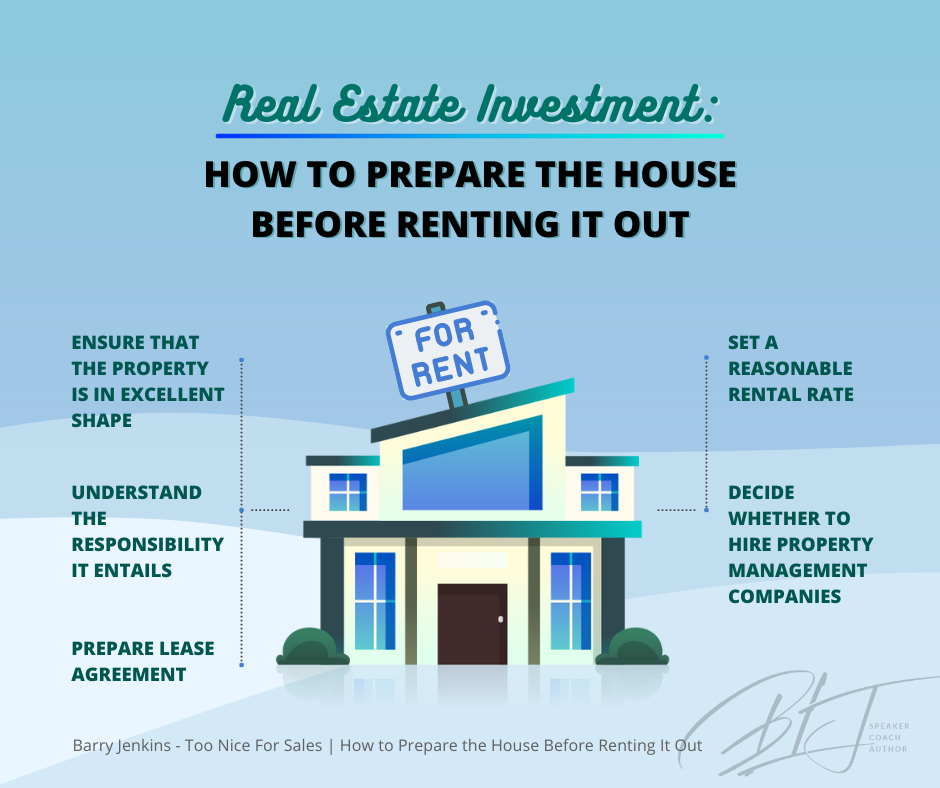Investment: How to Prepare the House Before Renting It Out
Here's How to Prepare Your Home Before Renting Out to Maximize the Value of Your Investment!
Many people look for ways to make passive income, and some look for ways to do with their properties. Some opt to rent out their homes when they stay in the market longer than expected and can't sell them at their desired or break-even value. To learn more about investing, check out Real Estate Investing in Virginia Beach.
If it's your first time making the shift, you'll definitely want to know the best way to prepare your home before renting it out. This article will show you how to prepare your home so that when someone rents it out, they get the most out of the rental.
When you think about renting out your home, there are a few things that you need to consider before you get started. First, you need to know why you want to rent out your property. What type of tenant do you want? If you want a long-term tenant, you need to clearly understand what you want to see in a potential tenant. If you want a short-term tenant, you may want to have some flexibility in your rental agreement. Do you want to allow pets in the house? What about smoking? Does your property have an outdoor patio or balcony? Do you have any specific areas of the house that you would like to be kept clean? These are all important considerations, and you must assess them before looking for a renter.
Before getting your head spinning with those questions, let's talk about how to prepare the house for renters.
Ensure that the property is in excellent shape
As a landlord, make sure that what you are offering to prospective tenants is a place they can see themselves living in it. Tenants prefer to choose a house ready to move in and know it is well-maintained. Inspect diligently and check for areas that require any repairs like roof leakage, wiring problems, or paint issues. Fix them right away and make the property rent ready. Whether a single-family home or an apartment, it would be nice to move personal stuff away, including broken furniture, make some arrangements, and make it a livable home to appeal to more soon-to-be tenants. Think of ways to make your tenants happy, which could boost your potential rental income. For additional read, check out How to Furnish Home on a Budget.
What to do:
Declutter and remove any invaluable things.
Clear up the space.
Paint the walls with a fresh layer of the color of choice.
Check and replace appliances that are no longer working.
Check your HVAC system
Get your carpets cleaned thoroughly.
Deep clean and fix windows.
Inspect for any pest infestation and hire pest control services.
Have someone give some lawn care to improve curb appeal.
Understand the responsibility it entails
Renting out your home for the first time might be overwhelming. It is ideal for orienting yourself first on what you are getting into before engaging in it. Determine if being a landlord is something you can handle because many obligations are involved.
You must be on top of many aspects of running your rental home smoothly. Check if the mortgage is updated and has stipulations about renting. Some FHA loans may require a homeowner to occupy the house about a year before renting. However, if you are buying a rental property with no intentions of living in it, you must inform your lender about it. The mortgage company has certain rights to the home to protect its security interest on the property. Notifying them about your intended use may require you to submit additional legal requirements.
Moreover, obtain the appropriate insurance policy because accidents happen, and you want to prepare for unexpected expenses properly. Although you may spend a bit more on insurance, protecting yourself and the tenant from risks when untoward incidents happen is essential. It is advisable to switch your homeowner's insurance policy to a landlord property insurance policy to cover any losses due to the tenant's negligence and any damages caused by fire, flood, or natural disasters.
Prepare lease agreement
It is a vital contract and is the foundation of any rental property. It stipulates the obligations, lease terms, restrictions, and disclosures that both parties must know. It states maintenance or repairs requests as well as the process of payment terms, deposits, and other fees that should be settled. To ensure that the lease agreement does not violate any local, state, or federal laws, consult a lawyer about the legal document or, better yet, hire a lawyer to create it. Then, we can call it safer because they can cover all your bases by inputting the details and reviewing any changes.
It usually includes the following details:
Names of tenants
Description of property
Duration of tenancy
Amount of monthly rent, including security deposits and the process of collecting them
Maintenance, repairs, and other policies about smoking, pets, lawn care, etc.
Set a reasonable rental rate
Everyone knows that rental rates depend on the property's location and condition. If you want to establish a reasonable rate that appeals to potential renters, set a competitive monthly rent by inquiring about the neighborhood's average and compare your home to other rental properties with similar features nearby.
Decide whether to hire property management companies
If you don't want to get stressed with all the fuss about overseeing your rental home, consider hiring property management companies or a real estate agent who can act as your property manager. Most likely, they are more experienced in the business, and they can help you with all the things you need. They pretty much know the rental market and help you find a good tenant. They can assist you in preparing your unit because that's their job.
However, if you want to learn more about leasing, it is ideal to be hands-on and start from the basics. You have the opportunity to consider your resources and how you can work on them. It gives you room to grow and learn in the rental business by stepping into the shoes of being owners to landlords and accepting the challenges along the way. Be aware of landlords' and tenants' rights, which may vary in different states. If you plan to manage it yourself, ask potential tenants to fill out an application form that includes their names, employer, previous landlords, references, and anything you like to know which must be relevant. A wise landlord would ask for their Social Security Number and get authorization to have a background check, criminal history, rental history, and credit reports.
If you are still unsure about your capabilities, hiring professionals who know what they are doing is best. However, take note of the additional costs for you since property management firms usually charge 4%-12% for the services they offer. They are responsible for the landlord's responsibilities, such as finding and screening prospective tenants, managing maintenance and repairs, handling IRS payments, and dealing with tenancy issues such as eviction. Having a real estate agent to work with you can also help you market your rental by showcasing its vacancy and having a competitive edge. They can also give you tips as owners about preparing your unit to appeal more and make a good impression when the tenant moves in.


